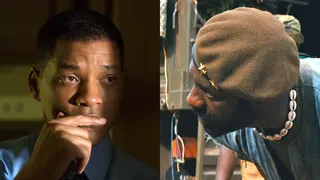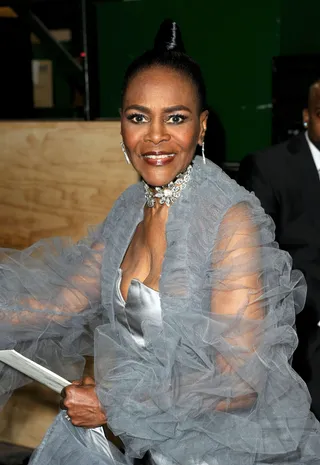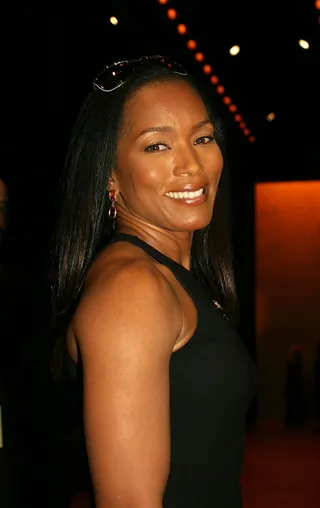#OscarsSoWhite: Black Actors Snubbed by the Oscars
Black talent that didn't get the recognition they deserved.

1 / 19
No Love - This year's Oscars are already being dubbed the "whitest" in nearly two decades. But this is nothing new. Last year, the hashtag #OscarsSoWhite went viral and expect that to happen again. Will Smith was snubbed for his critically acclaimed performance in Concussion and so was Idris Elba for his dynamic performance in Beasts of No Nation. This isn't the first time Black talent has been snubbed by the Academy. Here's a rundown of African-Americans overlooked by the Oscars. (Photos from left: Columbia Pictures Industries, Red Crown Productions / Participant Media / Come What May Productions / Mammoth Entertainment / New Balloon)
Photo By Photos from left: Columbia Pictures Industries

2 / 19
Ava DuVernay, Selma - Last year, the Academy Awards famously ignored Ava DuVernay in the Best Director category for Selma. The film was one of the most-talked about movies of the year, critically and at the box office, yet got no love. How can you explain that? (Photo: Dimitrios Kambouris/Getty Images)

3 / 19
David Oyelowo, Selma - Like his director DuVernay, David Oyelowo was also overlooked by the Academy Awards for his portrayal of Dr. Martin Luther King Jr. Oyelowo's breakthrough performance has been universally praised by critics and fans, who also remark on his incredible transformation into the civil rights leader. But this talented Brit shouldn't worry — we're sure he will deliver plenty of Oscar-worthy performances in his career. (Photo: Frazer Harrison/Getty Images for W Magazine)

4 / 19
Dorothy Dandridge, Carmen Jones - Dorothy Dandridge was nominated for a Best Actress Oscar for Carmen Jones, and film historians and fans of her work must continuously wonder what different trajectory her real life would have taken if she had won the award. This Black adaptation of Bizet’s Carmen, directed by Otto Preminger, allowed Dandridge to breathe life, sexuality, vulnerability and vitality into a film portrayal of a Black woman (without nudity or explicit sex scenes) that hasn’t been seen since. (Photo: Hulton Archive/Getty Images)

5 / 19
Sidney Poitier, In the Heat of the Night - Sidney Poitier won the Academy Award for 1963’s Lilies in the Field, but the role many felt he should have received the Oscar for was 1967’s In the Heat of the Night. As Detective Virgil Tibbs, Poitier took on racism while investigating a murder in a racist Southern town. When Poitier slapped a white man he was interrogating and uttered the words, “They call me Mr. Tibbs,” he entered the lexicon of film history forever. (Photo: dpa /Landov)
ADVERTISEMENT

6 / 19
Cicely Tyson, Sounder - Before enjoying a huge career as a leading lady on the small screen, Cicely Tyson wowed big screen audiences with her role as Rebecca Morgan in Sounder. She played a 1930s wife and mother who must keep her family intact after her husband is sent to a prison camp for petty crime. Tyson’s powerful, stoic and stately performance earned her an Academy Award nomination for Best Actress, which is an accolade she should have undoubtedly won. (Photo: Jason Merritt/Getty Images)
Photo By Photo: Jason Merritt/Getty Images

7 / 19
Danny Glover, The Color Purple - In 1985’s The Color Purple, Danny Glover played Mister Albert Johnson, the abusive man-child husband of Celie. Despite the Black backlash over the film’s controversial depiction of Black men, Glover's multifaceted and layered performance allowed windows into where rage and abuse is born — revealing the pitiful and tortured person beneath the man. An overlooked Oscar-worthy performance for Best Actor, simply because it allowed you to feel empathy for Mister by the film’s last frame. (Photo: DAN CALLISTER Online USA inc)

8 / 19
Diahann Carroll, Claudine - Some balked at the idea of the elegant Diahann Carroll playing welfare mom of six Claudine, but Bronx-born Carroll pulled this Best Actress Oscar–nominated performance off flawlessly. Carroll personified the ball of frustration caused by a system that won’t allow you to get ahead and judges your personal choices. And audiences got a chance to delight in a role that was sexy, vulnerable and indomitable. It's a nomination that should have most definitely been a win. (Photo: CBS /Landov)

9 / 19
James Earl Jones, Great White Hope, Claudine - James Earl Jones was nominated for an Academy Award for Best Actor for his role as Jack Jefferson, based on boxing champion Jack Johnson. A stirring, star-turning portrayal that should have catapulted Jones to the level of Hollywood reverence given Sidney Poitier’s career, the film’s controversial themes may have hindered those possibilities. Jones’s role as Rupert (Roop) in Claudine was equally noteworthy, as the actor gave a voice, heart and tears to men dubbed "deadbeat dads." (Photo: CBS /Landov)

10 / 19
Diana Ross, Lady Sings the Blues - Naysayers were doubtful that Diana Ross could pull off playing Billie Holiday for her feature film debut in Lady Sings the Blues because the two did not share the same physical type. But Ross proved otherwise in her gritty, desperate and exposed depiction of Holiday. This star-making vehicle ended up earning Ross a Best Actress Academy Award nomination. But for the strongest film performance in her career, Ross should have brought home the gold. (Photo: Detroit Free Press/MCT /Landov)
ADVERTISEMENT

11 / 19
Billy Dee Williams, Lady Sings the Blues - Lady Sings the Blues was the first Billy Dee Williams film that officially christened him a matinee heartthrob for the masses. Biographers debate the nobility of Billie Holiday’s husband Louis McKay, but Williams took the high road in his performance. Portraying him as a sensitive, loving, patient yet tortured spouse of an addict, Williams added layers of richness to the depiction of Black men in film. And he looked breathtakingly handsome doing it. (Photo: CBS /Landov)

12 / 19
Whoopi Goldberg, The Color Purple - Whoopi Goldberg won the Best Supporting Actress for 1990’s Ghost, but most filmgoers believe Oscar voters missed the mark by "only nominating" her for her stunning film debut in 1985’s The Color Purple. Goldberg’s Celie wasn’t just a study in victimhood; the role charted the triumph of the spirit and examined one Southern Black woman’s life journey onscreen in a way that had never been seen before. Goldberg displayed the fearless muscle and tenderness of an acting vet. (Photo: Paul Hawthorne/Getty Images)

13 / 19
Angela Bassett, What’s Love Got to Do With It - With Angela Bassett’s powerhouse portrayal of Tina Turner in What’s Love Got to Do With It, Oscar voters revisited the idea of another Black Actress Academy Award nominee. Bassett earned the nod by putting in the physical work — training and remaking her body to match Turner’s athletic gait — and created the performance of a lifetime. In her depiction of Turner’s harrowing abused-wife tale, Bassett portayed Turner's equal parts of fire and fear to near perfection. (Photo: Katy Winn/Getty Images)
Photo By Katy Winn/Getty Images

14 / 19
Laurence Fishburne, What’s Love Got to Do With It - As Ike Turner in What’s Love Got to Do With It, Fishburne avoided the caricature road in his portrayal of Tina Turner’s genius but abusive and drug-addicted husband. He brought the same layers and depth that the great Black actors before him did, and raised the bar. As memorable for his wigs as for his dialogue, Fishburne’s Turner was charismatic, crazed and occasionally funny. He earned an Academy Award nomination for Best Actor. (Photo: Mark Mainz/Getty Images)

15 / 19
Samuel L. Jackson, Jungle Fever, Pulp Fiction, The Hateful Eight - Many critics described Jungle Fever, Spike Lee’s exploration of interracial relationships, as extremely uneven. What shined on a stellar level was Samuel L. Jackson’s crack-addicted portrayal of Gator. A tragicomic portrayal of anguish, Jackson cinematically channeled a drug abuser perfectly. Even this year's performance in Quentin Tarantino's The Hateful Eight, got him no love.(Photo: Andrew H. Walker/Getty Images)
ADVERTISEMENT

16 / 19
Viola Davis, Doubt - Hollywood still hasn’t figured out how to fully glean the megatalents of actress of Viola Davis. As Mrs. Miller in Doubt, she goes toe to toe with Academy Award–winning actress Meryl Streep and emerges a true peer line by line. Davis received her second nomination for this year's The Help.(Photo: Kevork Djansezian/Getty Images)

17 / 19
Derek Luke, Antwone Fisher - Derek Luke’s breakout film debut as Antwone Fisher, a navy man with a troubled past, was an amazing introduction to a young actor with tremendous depth. With a few exceptions (Catch a Fire, Lions for Lambs, Friday Night Lights), Hollywood’s offering of roles to Luke since Denzel Washington’s directorial debut hasn’t completely lived up to his dynamic promise. But Luke’s Oscar-worthy performance in Fisher is a reminder of what he can do with leading-man material. (Photo: Jason Merritt/Getty Images)

18 / 19
Kimberly Elise, Beloved - As a relative newcomer acting alongside Oprah Winfrey, Danny Glover and Thandie Newton, Elise was likely just hoping to stay afloat in Beloved. Instead, she shined as Winfrey's daughter Denver in the intense slave-era drama. The then 20-year-old was recognized by critics and audiences as the heart and spirit of an otherwise gut-wrenching film, but was overlooked for the Oscar nomination many felt she deserved.(Photo: Anna Webber/Getty Images)
